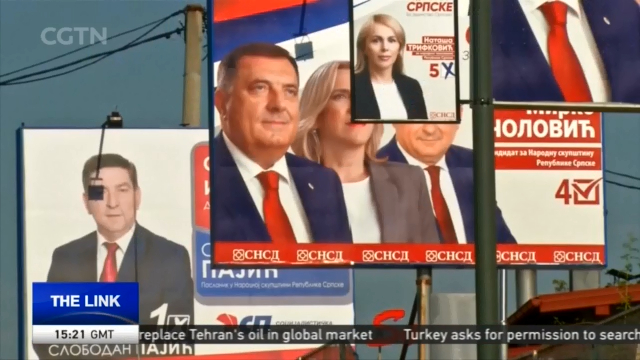
09:19, 09-Oct-2018
Bosnia Elections: Nationalist parties win Bosnia's parliamentary vote
Updated
08:16, 12-Oct-2018
03:32

Preliminary results show the Croat, Muslim and Serb nationalist parties have won big in Bosnia's parliamentary election. The three parties will dominate all layers of Bosnia's complex government for the next four years. The administrative apparatus running the country is huge and complex, and it was designed to overcome ethnic tensions that exploded in a civil war over two decades ago. Our Aljosa Milenkovic is in the capital Sarajevo and sends this report.
Scars of the war are still visible in the Sarajevo quarter. They act as a reminder of what can happen here when ethnic tensions spiral out of control. It seems some local voters need no reminding, judging by the fact their expectations for the elections are mostly focused on increasing their quality of life.
MATEA ELEZ CITIZEN "In the first place, after these elections, I'd like to see employment rates increase and a change in government. They are not adequate and competent enough for the young and for the country's future."
VESELIN MIJANOVIC CITIZEN "I expect these elections to bring some badly-needed changes, so this country could finally move forward on the European road of development."
ALJOSA MILENKOVIC SARAJEVO "People across all of Bosnia and Herzegovina feel the country is stuck in a political limbo that's keeping it from moving forward. The culprit, they believe, is the complicated political system, the result of a peace treaty reached two decades ago at the end of the civil war. But others suggest it's exactly that system that's preventing the country from slipping into bloodshed and conflict once more."
At the end of the day, when the results were released, it was obvious the majority of voters want to keep this delicate balance through the complicated political system. Bosnia and Herzegovina is comprised of two entities: the Muslim-Croat Federation dominated by Bosniacs and Croats, and Republika Srpska, dominated by Serbs. Under the Dayton agreement, which ended the civil war in 1995, each of those three entities elects a member to the joint presidency. Bosniacs elected Sefik Dzaferovic, representative of the SDA, the ethnic group's strongest party for decades. The SDA advocates for a unitarian Bosnia. It would like to see changes in the attitudes of Republika Srpska politicians that seek independence.
SEFIK DZAFEROVIC ELECTED MEMBER OF BOSNIAN PRESIDENCY "The best message for all representatives of Republika Srpska is not to constantly attack the state of Bosnia and Herzegovina. Because if they continue their current policies, then they themselves are leading that entity into a problem."
Leading the other side is the longtime president of the Republika Srpska, Milorad Dodik. He's seen as one of the biggest supporters of the Republika Srpska leaving Bosnia and Herzegovina.
MILORAD DODIK ELECTED MEMBER OF BOSNIAN PRESIDENCY "As a Serb member of the presidency, I will work to improve the position of the Republika Srpska, to number one in Bosnia and Herzegovina. My slogan will be 'Republika Srpska before all'. It'll be a republic that will engage in protecting the constitution and its constitutional position in Bosnia and Herzegovina."
Maybe people here aren't happy with their living standards, but these elections results suggest they are willing to put the status of their country first. Aljosa Milenkovic, CGTN, Sarajevo.

SITEMAP
Copyright © 2018 CGTN. Beijing ICP prepared NO.16065310-3
Copyright © 2018 CGTN. Beijing ICP prepared NO.16065310-3